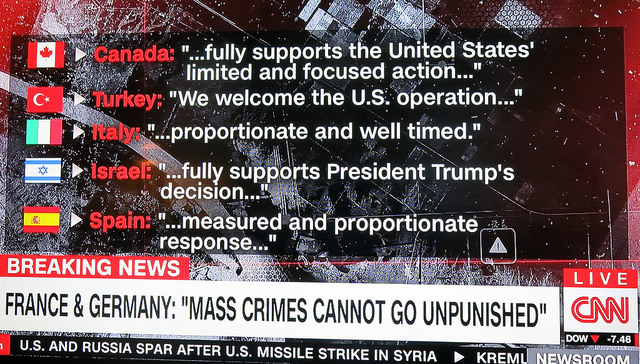It is increasingly clear that the United States will not be seeking “regime change” in Syria, which has been foreseeable since President Trump ordered missile strikes two weeks ago. American news media has largely accepted the claim that Trump acted out of emotional impulse, to worldwide acclaim. Irresponsibly, this narrative overlooks his cynical motivations. Trump didn’t order missile launches because he thought it was the right thing to do. He did it because he recognised a political opportunity.
Trump’s intervention was a hollow expression of American power that was nevertheless effective. He successfully marketed a light naval bombardment as a righteous crusade, leading to a surge of support both domestically and abroad. The strikes lifted his dismal approval ratings, quieted congressional opposition, and were met with enthusiasm by skeptical allies like Germany. They also placed diplomatic pressure on China during major talks with Xi Jinping, and Russia ahead of Secretary of State Rex Tillerson’s current meetings with Putin in Moscow. Trump clearly spotted the chance for media spectacle, and exploited it to strengthen his otherwise floundering government.
In real terms, the strikes were almost insignificant. American warships fired fifty-nine Tomahawk cruise missiles at Shayrat airbase, south of Homs. The missiles destroyed six planes, killed seven people, and injured several others. Moscow was told about the strike in advance, and evacuated both its personnel and equipment, along with several senior Syrian officers. The attack damaged several important buildings, but did not touch the runway itself, allowing Syrian jets to take off very soon after the strike. Secretary of Defence James Mattis may claim that the strikes damaged “20 percent of Syria’s operational aircraft,” and that “use of the runway is of idle military interest,” but the evidence doesn’t back this up. The attack seems to have been designed for its narrative impact, not its overall strategic significance.
Administration officials have basically admitted as much, with Mattis arguing that the bombardment was “singular, against the chemical-weapons use,” and punitive in nature. The question is whether the missile strikes were fully about deterring the usage of sarin gas in the first place, or if Assad has also been punished in order for the Trump administration to reach out to a non-Syrian audience.
After weeks of controversy, nearly every American newspaper has endorsed the move, along with the governments of Germany, the United Kingdom, France, and the United Arab Emirates. Congressional Democrat leaders Chuck Schumer and Nancy Pelosi both endorsed the attack, and have only criticised its constitutionality. Republican rivals John McCain and Lindsay Graham have been overjoyed, pushing Trump for greater military action. Following the strikes, Fareed Zakaria proclaimed that “Donald Trump has become president.” This is in spite of him saying that Trump “has spent his whole life bullshitting” and “is indifferent to things that are true and false” less than a month before that.
It is hard not to think that this was the point. Trump has won over the majority of his governmental opposition overnight by disciplining an easily identifiable Arab enemy that kills “babies, innocent babies.” He is now praised for his decisiveness in ‘doing the right thing,’ and in terms of foreign policy, has fulfilled his promise of making America great again. For at least a news cycle, Americans can fawn over heavy ordinance, relish in machismo, and feel like a global promoter of justice and freedom. Ivanka Trump, now her father’s most popular staffer, has even been portrayed as heartbroken at the world’s misfortunes. Trump is aware that many of his critics are satisfied with shows of force that reminds the world (and most importantly themselves) of American heroism and military might. It doesn’t matter if it actually stops fighter jets from taking off.
Of course, this isn’t new. Since the Vietnam War, the United States has been in a period of extended decline, punctuated by spectacles of violence that repress acknowledgement of that fact. Jean Baudrillard argued that the Gulf War was one such moment, where the reality of the conflict was completely at odds with the narrative power of its media presence. During that conflict, the US applied media techniques that were perfected in wars against Panama, Grenada, and the Falkland Islands, in order to present “the perfect semblance of victory” that would push back against the Vietnam syndrome.
In May 2011, President Obama offered Americans largely the same panacea with the Navy SEALs raid that killed Osama Bin Laden. Bin Laden’s death was spun as hard-earned justice, in spite of major legal and ethical issues surrounding the raid itself, and the fact that the War on Terror had developed beyond him. Trump has followed up by waging his own Gulf War, offering the perfect semblance of a humanitarian intervention in Syria without actually doing it. Trump has the further benefit of now seeming like he’s “stronger than Obama,” despite continuing with his strategy of prioritising Islamic State.
Obviously, the distraction will lead to inadequate coverage of Trump’s agenda for weeks. As a result of his theatrics, Tillerson is now in Moscow with the media focussed on Putin’s support for Assad. Their other topics of discussion, relating to fossil fuel extraction, climate change, and Russian aggression in Eastern Europe, will now take place outside the public eye. There is little discussion of Trump’s legislative plans following the Trumpcare fiasco, and how Democrats plan on resisting it after largely falling in line behind his ‘cruise missile diplomacy.’ There has also not been enough reflection on Trump’s disastrous meeting with Xi Jinping. After nearly a year and a half of promising to “get tough on China,” during the Mar-a-Lago summit, Xi held his ground on every major trade and currency issue. Xi has also been dominant in current tensions over North Korea. If not for the missile strikes, Trump would have faced much more controversy.
Perhaps that is the real lesson. As long as the United States is a world superpower, its leaders will be able to use its military might to avoid engaging with important social questions. Its current media landscape is too corporatist, and obsessed with war coverage, to do more than enable that. All that has really changed is the scale. Instead of George H.W. Bush calling Saddam Hussein “another Hitler,” press secretary Sean Spicer is now digging for ways to say that Bashar al-Assad is worse than Hitler. It’s tempting to conclude by calling for more critical coverage, but media outlets have been frequently critical of Trump over the past two years. He is largely immune to negative coverage, and can still generate positive coverage in cases like his speech to Congress.
Essentially, the problem is that Trump understands that the politics of the spectacle are now the norm. Trump may not be knowledgeable about world affairs, but he knows how to promote his own brand. His instincts are sharp when it comes to manipulating public perception. He is acutely aware that Americans do not trust the news, except when the right political content is being broadcasted to them. It is likely that there will be more theatrical punitive military attacks, as American democracy continues to disintegrate. The overall trend is likely to accelerate under Trump. Even as I was editing this article, the US Army dropped the largest non-nuclear bomb in its arsenal on Nargarhar province in Afghanistan.
Photograph courtesy of torbakhopper. Published under a Creative Commons License.





